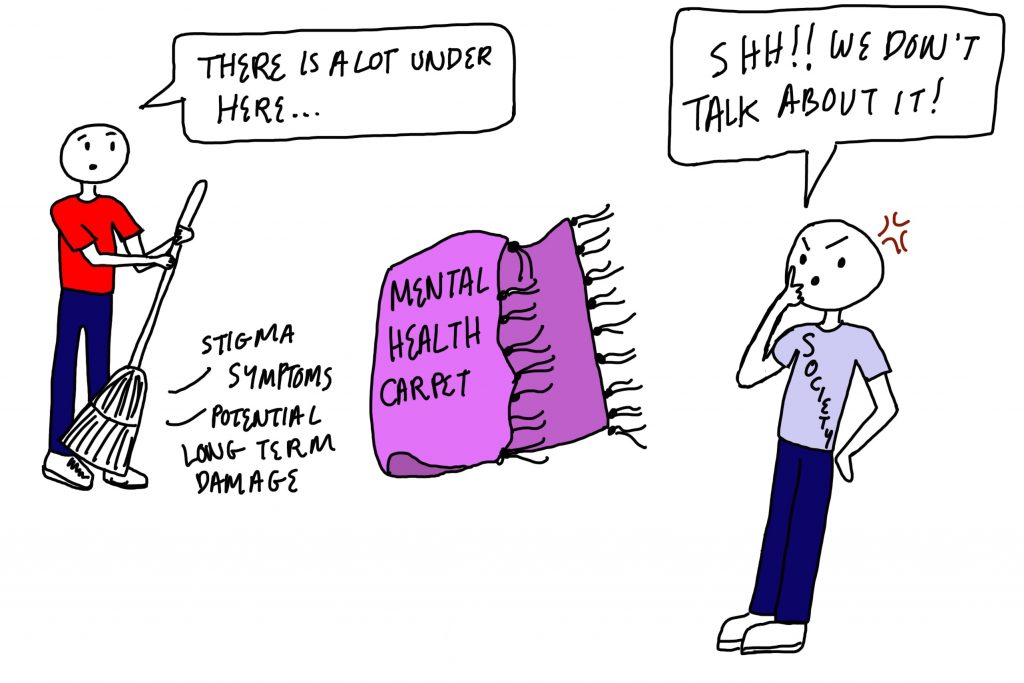By Mirika Jambudi (III)

Four out of five people will be affected by a mental illness or neurological disorder at some point in their lives. Whether you or a loved one is affected, the mental health crisis has touched the life of every single human, placing mental disorders in the foreground of global health issues. However, despite the extent to which mental illness permeates our society, significant improvement will not be possible until we erase the stigma surrounding it. Mental illnesses aren’t uncommon, so why are we still speaking about them in hushed tones and behind closed doors? Why don’t we send our ‘thoughts and prayers’ to people suffering from debilitating bouts of mental illness? And why are we so afraid to speak up about our mental health problems?
The answer lies deep within centuries of cultural stigma. In the Middle Ages, mental disorders were thought to be a punishment from God or a form of demonic possession. People who displayed symptoms were burnt at the stake or locked up as a means to control them. Although science and philosophy have since shown that mental illness is a medical condition, thousands were still persecuted in Nazi Germany due to their condition. Even more recently, people with mental disorders have been cast aside and locked away in insane asylums because others were afraid of them. They were thought to be crazy, violent, and dangerous.
Since then, society has shown some progress. Doctors and medical organizations now recognize mental illness as a genuine health problem that can be treated using therapy, medication, self-help, and rehabilitation. Treatment and support systems are more available than ever before; and yet, the people who need them may never receive them because of this prevailing cultural stigma. The false perceptions and stereotypes surrounding mental illnesses isolates victims and only makes them sicker. This is common around the world, with the stain that mental illness carries making people afraid to disclose their problems to their families. As a result, they end up hiding symptoms and sweeping their illnesses under the carpet, which only hinders recovery. People are so afraid of being seen as “crazy” or “weird” that 60% of people with known mental health disorders never end up receiving help from a mental health professional (Worldwide Health Organization). This is even worse in developing countries, where that percentage reaches 90%.
In addition, media and popular culture paint a misleading picture, through fear-mongering movies like “Split,” which present a character with a dissociative identity disorder as dangerous, or shows like “13 Reasons Why,” which dehumanize characters with depression and glorify suicide. With negative portrayals consuming youth entertainment, there aren’t enough positive portrayals that accurately describe what it’s like to have or support someone who has a mental illness. Misrepresentation and underrepresentation are what leave people uneducated in the subject matter, making them perhaps more likely to distance friends who have mental health problems– as we are always scared of things we don’t understand.
So, when someone confides in a loved one that they are suffering, the reactions are often
insensitive. Even in families who understand and legitimize mental illness, there is hesitancy around getting professional help because it makes people feel that they have failed. In reality, mental illnesses are never a personal failure—they are real illnesses that reflect nothing about the character of a person. We must treat sufferers the same way we treat people with other illnesses: with kindness, empathy, and concern. But widespread change can only happen through education and awareness. The issue lies in a lack of knowledge and understanding, and teenagers are particularly afflicted. Especially in high school, the stressful atmosphere and clash of cultures creates a community where illnesses go untreated all the time. Therefore, it is our generation’s responsibility to help educate parents and students on the reality of mental illness. We must stop speaking in hushed tones and, instead, create an accepting and supportive community. As students, it is our responsibility to step up and be there for our friends when they need it, show empathy and concern, and foster an open dialogue between parents, students, teachers, and healthcare professionals about mental health.
